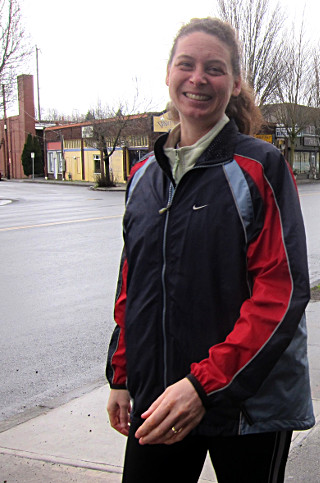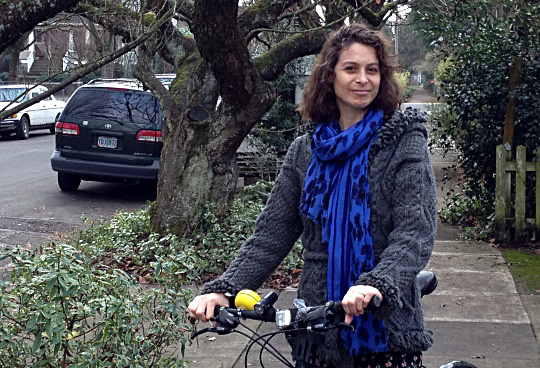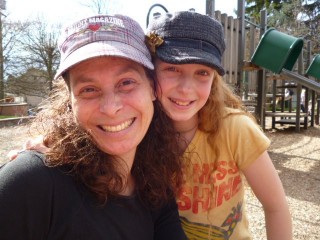
commuter, daughter, wife, mom and (for one constantly
interesting year) BikePortland’s lifestyle columnist.
(Photo: M.Andersen)
Publisher’s note: Cathy Hastie, a regular columnist here on BikePortland for the last year, passed away yesterday after a fight with cancer.
——
The email arrived with a chime at 9:16 in the morning.
“I have been wanting to be more involved in something I believe in and couldn’t quite decide what, until I saw your publication mentioned in Street Roots. Do you need articles? editing? How can I be useful (without dedicating my entire life to your cause?)”
That was two and a half years ago. I was trying to heave my odd little magazine about low-car life from a one-person project into a team production, and generally saying yes to every offer available. So I and the woman, whose name was Cathy Hastie, scheduled a Sunday brainstorm at the Starbucks in Hollywood.
I told her we couldn’t pay; she said that was fine. She was a mom in her early 40s with a consulting-firm job and a mortgage. Experience was more important than cash. We agreed that sometime in the next month she’d send over a sample column about “low-car culture.”
Here’s a secret: this is the sort of offer small publishers get regularly. In most cases you never hear from the person again. But at 10:30 p.m. on Saturday, March 31, another email came in.
“Well it is now officially the end of March,” she wrote. “I have completed 3 articles.” They were attached.
That was the Cathy I came to know over the next two years: unpredictable, unflappable, and just frazzled enough to remind you there was a strong pulse of life beneath what I slowly came to realize was a powerful sense of direction.

(Photos courtesy Cathy Hastie.)
Some of the columns she submitted were not fantastic. They overdosed on detail or buried their gems in three too many jokes. But the best parts were magnificent, like the time she described car2go as “picking up available vehicles like drunk frat boys in a singles bar” or her column capturing the urban magic of hashing, the alleycat-on-foot tradition she joined each month:
The hash leads us up and down the voluptuous hills of Portland, entangles us in her twisting undergrowth and allows us to sneak a peek at her foundations.
Sometimes she wears a girdle or some ratty briefs. But more often than not, it’s a lavender negligee.
One month, she sat on the Hawthorne Bridge for an hour and made a full tally of every bike commuter’s fashion choices by gender. For another column, she spent more than four hours gathering and analyzing what might be the most comprehensive statistics on car and bike stop sign behavior ever collected in Portland.
I loved her biker’s ode to the butt:
When I’m on a bicycle, it’s just part of the scenery. Fit or flabby, grand or petite, it is simply the motor to our human-powered motion. Very useful indeed.
So don’t get bent out of shape. If you are a biker, I have seen your butt. And you have probably seen mine. Just pat yourself on the back (or further down if you feel so moved) and know that with every downstroke, you are improving the view, creating a tauter, shapelier Portland panorama.
Cathy had plenty of detractors. After she joined me in the jump to BikePortland, her first column struck some as arrogant and self-congratulatory. And then there was this column, which we agreed to publish, after some back and forth with her, because the whole point of having her on board was to bring a different perspective to the site:
The king of arrogance is the biker without a helmet. He is announcing to the world that he is too skilled to allow himself to be hit by a car.
After the first 100 furious ripostes to that one, we talked Cathy (“I have my opinions and other people have their opinions,” she wrote in an email. “Why do I care what they think of mine?”) into posting an explanation of sorts.
I don’t know if it was the good spirit she showed with that comment, or a growing cohort of hate-readers, or the fact that she was an opinionated bike-loving woman willing to piss Portlanders off, but it was a turning point for Cathy and her audience. From then on, almost all her columns were traffic hits, and almost all the comments beneath them were friendly. The Portland Society invited her to be a guest speaker. So did the Sprocket Podcast.
It seemed like an ass-backwards way to find a voice and an audience, but Cathy had. And over the next year — her last year — she found her subject, too.
Advertisement
In one of the most remarkable editing experiences I’ve ever had, Cathy began submitting unsettlingly perceptive columns about a theme that neither of us recognized at first: the relationship between her personal transportation choices and her body’s physical decline and death.
Here’s the first, from a column about the fact that she could no longer brag about running or biking to work every day:
Today, no one can tell that I am “sick.” I look the same, even better than before the illness. My medical condition doesn’t preclude me from running to work like I had been doing for the last 13 years. In fact, I still run, just not to work. I bike. And occasionally, when I’m feeling particularly uninspired, I ride the bus. …
Living under the weight of something as serious as not living made me realize that bragging rights are solely for braggarts. Doing something for the sake of saying that you did it was not enough for me anymore.
When it comes to my commute, I am doing what feels good for me. And the truth is that most people do what feels good to them. We low-car eco-warriors have to be OK with that. Sometimes sitting in a dry, warm car feels pretty good. If we want commuting habits to change, we have to offer choices that feel better.
She followed with a plot twist: she’d accepted a position based in Vancouver and started car commuting for the first time in 15 years.
Today’s business model assumes that employees will do whatever it takes to earn more money, build more prestige and climb higher on the professional ladder. They assume we live the accompanying middle-class, suburban, auto-centric lifestyle. But I don’t like to drive, let alone cut throats and climb ladders. …
I value my time and how I spend it, maybe even more than my money. … My dilemma was eating me up. Ideally, careers improve with time, and my Vancouver opportunity was a stepping stone in the right direction. But how much was I willing to give up now for the promise of a rosier future? If I sacrifice this pillar in my moral structure, who’s to say the roof won’t cave in as I sink deeper and deeper into a materialistic pit, swimming in money while gasping for air?
Perhaps this pebble is just the first in what could turn into a landslide of sacrifices, eroding the hard-fought lifestyle gains of flexibility, stress-reduction and being true to convictions. Would I start traveling too much, seeing less of my family, working 60+ hours a week? In other words, killing myself slowly? …
Notwithstanding the decision to go to Vancouver, I still believe that lifestyle counts as much as salary. I vow to find a creative work arrangement that honors my core values. The burden of dragging a car around, the cost of gas, the time spent sitting still – somehow I will counterbalance these factors. I’ll let you know what I come up with!
The next column that popped into my inbox, right on schedule, was the best and most haunting thing I ever saw her write. She called it “What a car is good for.” It opened like a piece of bike-blog trolling to top her earlier one:
The car serves a multitude of purposes that have become essential in the modern world.
Then she slowly threaded cracks across the facade:
The average workplace doesn’t provide a private place to eat lunch, make personal calls or take a nap, let alone have a cigarette, watch an episode of “Archer,” or ogle the Sports Illustrated Swimsuit edition (not necessarily in that order). What better place to perform these important lunch-hour tasks than inside your parked car, anonymous amongst thousands of others, ordered and sorted in the acre-wide company parking lot? The car gives us the isolation that our gadget-driven culture demands and our efficiency-oriented employers force upon us.
“The car is a great place to store garbage,” she observed. “Delivery errands can be put off for months when the items are all crammed into the trunk, invisible and forgotten.”
By the end of the post, she had perfectly captured everything I’d come to hate about myself in the years when I got around by car, but had never found the language for at the time.
The car makes us independent — so independent that we can drive 45 minutes to work in a neighboring city every day for a month without knowing a single thing about the place, its people, or what happens there. We use the unexplored city without connecting to it. The car distances us physically from the place we call home, so we ignore the community where we spend 8 hours a day. As a car commuter, we just don’t care.
During that editing process I emailed Cathy that I was honored our site was publishing the post. Also that I should have known she was an “Archer” fan.
“Ha!!!!” she replied.
The last column Cathy wrote for us published last month. It was remarkable in a different way: not as a reflection on the universal tragedy of car dependence but as a very specific account of how she believed her car commute had begun to literally kill her.
At 5’11” and 160 lbs, my body was capable of just about anything I asked it to do, from hoisting boxes to dancing the two-step to running a few miles through the neighborhood. …
No one could tell I was battling my own body’s errant cell-production assembly line. I sat for chemo once every three weeks, followed by more chemo in the form of pills taken every day. I went to work like everyone else. I volunteered. I directed a children’s play after school. Luckily, side effects didn’t stop me from living a full life. The cancer treatment had become my new “normal,” and I barely noticed it myself most days. …
Biking brought fresh air into my lungs, pumped blood to my extremities, and brought a sense of calm and appreciation as I moved through the city’s daily machinations. Details, blurry when passed at the speed of a car, revealed themselves as I took in lilting lilies, swaying birches, jumping dogs, toddling toddlers. … Bicycle commuting not only kept my body working, it stabilized my mental health.
Then, five months and three weeks ago, everything changed. My employer assigned me to a position 17 miles from home. I had to give up my bike commute. …
Tired from sitting erect and still for hours at a time, I didn’t have the time or energy at the end of the day to add on a bike ride or a swim. So I did nothing.
My back started to hurt.
Cathy’s account of the physical disintegration that followed is harrowing. You can read it if you’d like.
On August 24, no doubt with an eye on her usual end-of-the-month deadline, Cathy sent me an email:
I don’t know how much longer I will live — don’t say that out loud. And so I don’t know if I need to focus on creative writing or being with my kids. I don’t think writing about bikes when I cant even walk is very compelling. I don’t know what to do. I am sinking into the harsh realities of my predicament. Don’t expect much from me.
I told her that of course time with her kids would be well-spent, that we and the BikePortland audience were rooting for her and that her volunteer gig would be waiting for her once she recovered.
Cathy didn’t recover. She died this week, one month shy of her 45th birthday. Our hearts go out to her friends and family.
I was reluctant to sell Cathy’s final column too hard. Human health and medicine are mysterious, and I didn’t want us to make it look as if BikePortland was blaming car commuting for the symptoms of cancer and chemotherapy.
What I know is that of the many stories Cathy left us with, the one she told in those last four columns will stick with me all my life. As I follow her (I hope) into the pressures of parenthood, through the curves of a modern career and eventually the decline and failure of my own body, I’ll be thinking of hers — of the joy she took in using and writing about it, and the awful realization she went through as she watched it fall, semi-publicly, apart.
If using bicycles can teach us anything, it should be that our bodies are too precious to put to waste. Cathy, thanks for working so joyfully to help more of us see that.




